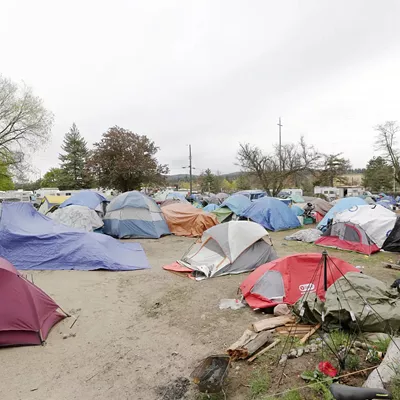This is what I heard one critic mutter as the lights went down on a screening of the latest documentary of climate doom, The 11th Hour. I knew just what he meant. The "other one" featured Al Gore, won an Oscar, and miraculously shifted the tide of public opinion toward the climate change yea-sayers (that is, the broad range of scientists not paid by ExxonMobil to insist that even if Greenland is melting, it isn't because of us). An Inconvenient Truth was a movie that enlightened legions, scared many and galvanized a few, but also left us limp and powerless in our seats, unsure of how to transport our bodies home afterward without ruining everything completely and forever. I mean, this guy was the U.S. vice president, for God's sake: If he couldn't do anything to stop climate change, how can we, in our puny little everyday lives, possibly compete?
It didn't help that An Inconvenient Truth wound down with titles against a black screen suggesting we all switch to hybrid cars and screw in compact fluorescents throughout our modest homes. In fact, it made things worse. It made it appear as if the film's producers, director and even Gore himself were unaware that nothing short of a far-reaching political solution -- like mandating that wind and solar replace fossil-based fuels -- will reverse our lethal course. Think we can do it, folks? Uh, no.
Narrated by Leonardo DiCaprio -- a superb actor but oddly dispassionate as an authority figure -- and directed by Leila Conners Petersen and her sister, Nadia Conners, The 11th Hour parades a dizzying crew of talking heads across the screen, intercut with horrifying shots of factory-farm animals and F4 tornadoes and gooey black effluent flowing into pristine oceans. It lines up scientists such as Stephen Hawking and NASA's James Hansen -- a climate expert the Bush administration notoriously fought to silence -- with more progressive visionaries such as author and radio host Thom Hartmann, who rightly warns that the buildup of carbon dioxide in our delicate earthly atmosphere is only the most conspicuous symptom of our biosphere's malignant disease. Indeed, the film stresses, we are not just warming the planet but also destroying habitats and poisoning soils, filling large pits in the ground with toxic waste and squandering supplies of fresh water. In the process, the species we most endanger may be our own. "The environment is going to survive," advises one expert, Kenny Ausubel. "It's us that's not going to survive."
The Conners sisters depart from the typical enviro-documentary gloom. Their film may linger too long on visions of floods and war and pestilence; it may reduce great speakers to bland lecturers by confining them all to the same side of a black-and-blue backdrop; you may wish somebody like Errol Morris had gotten involved to give the documentary a better dramatic arc (it seems longer than its 91 minutes). But such shortcomings are worth your patience, because The 11th Hour is ultimately a triumph of redemptive ideas that DiCaprio -- God bless his celebrity -- may finally succeed in transporting from the environmental fringe to the mainstream movie-going audience.
If it's possible to leave The 11th Hour quaking in your Earth Shoes over the quickening pace of planetary destruction, it's also possible to hold firm to the notion that we have a way out of this mess. It isn't an easy route, and we may not always like the ride. But as The 11th Hour persuades you in the end, we choose it or we die. (Plays tonight at the Panida, and Friday-Tuesday at the Magic Lantern; Rated PG) n
















